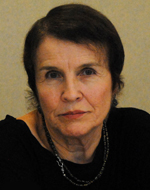A moment of historic reckoning
Our legacy: AFSCME stands for the rights of all
|
|
|
Roberta Lynch |
We are in the midst of a global pandemic that has upended every form of social, economic and cultural activity in our country. From the outset, our union has been on the front lines of an unrelenting daily conflict with this ferocious invader, the coronavirus.
We’ve been able to ensure that thousands of employees can work remotely, safe in their own homes. And for those who’ve had to report to worksites to perform essential public services, we’ve put stringent safety protocols in place and made certain that needed personal protective equipment is available.
We have made clear beyond any doubt that AFSCME will not waver in our determination to safeguard the lives of every single member.
Yet even as we rise to meet the unprecedented challenges posed by this pandemic, our nation faces another test of historic magnitude. The flagrant killing of George Floyd by a Minneapolis police officer in the broadest of daylight before dozens of witnesses has shaken our country to its core, forcing a profound confrontation with the persistence and depth of ingrained racial prejudice.
This also is a moment when our union is called to action. Diversity has always been our greatest strength—bringing together as we do working people of different races, religions, and regions, sexual orientation, political beliefs, and professions. From that diversity, we have strived over many decades to build unity, to come together in solidarity, and—fighting as one—to triumph time and again.
The wealthy and powerful who would keep us down have consistently sought to foster division and conflict, but AFSCME members have refused to succumb, choosing instead to find common ground on which to move forward together.
Now, as our country grapples with the harsh reality of systemic racism so starkly exposed, we must recognize that common ground is no longer a sufficient foundation for progress. At this moment of national trauma, our union is called to move to higher ground.
It is a time to recall our own history, the legacy of those who came before us—in Illinois and across the country—who built a union strong enough to withstand the harshest assaults and brave enough to stand up for the rights of all.
From its earliest days, AFSCME opened its ranks to every worker, regardless of race or creed. We can think back to the historic Memphis sanitation workers strike of 1968 when the most marginal and oppressed of workers—hundreds of African-American trash haulers whose wages were paltry, whose equipment was decrepit, and whose pleas for fundamental fairness were ignored—came together as AFSCME members to demand fair pay, safe working conditions and fundamental respect in a Southern city where racism still ruled.
The righteousness of the sanitation workers’ cause moved Dr. Martin Luther King to travel to Memphis to march with them and to share his vision of a better America. It was there, in the midst of that struggle, that his life was taken by an assassin’s bullet.
The most iconic image of that hard-fought strike is the sign those workers carried, simply stating: I AM A MAN.
Why, some might ask, did they need to identify themselves as “men”—wasn’t that plain for all to see? But, of course, their message was about something much deeper—a firm insistence on their dignity as human beings. It was a necessary statement because their fundamental humanity was not truly recognized. Or, as Dr. King put it in his speech to the strikers, “We are saying that we are God’s children.”
It is a message that has reverberated down through the years—its echo heard in all the ensuing battles against racial discrimination and other forms of abasement that would deny or even crush that humanity.
It is a message rekindled at this moment in the declaration “Black Lives Matter.” Like those signs carried in 1968, the clarion call of “Black Lives Matter” today is a necessary assertion because even after so many long years of suffering and struggle, the fundamental humanity of black people is still not fully recognized.
We must affirm that black lives matter if we are to give true meaning to our shared conviction that all lives matter. That affirmation does not mean that we set ourselves against those honorably engaged in law enforcement. But it does mean that we stand squarely for equal justice under the law and firmly against all forms of brutality, cruelty or wanton disregard for human life perpetrated by those pledged to “serve and protect.”
We cannot close our eyes or turn away from the stark reality of racial injustice, just as we cannot ignore the profound threat posed by the coronavirus. Both can erode the solidarity we’ve worked so hard to build in our union and the democracy we’ve treasured as the hallmark of our nation.
So, yes, our union is called to lead at this moment of historic reckoning. We are called to move to that higher ground where every human life does matter, where the dignity of every human being is respected, where we can all meet as equals. Getting there may be a hard climb. But hard is what we know how to do. This is the challenge before us now—and it is one we cannot fail.




